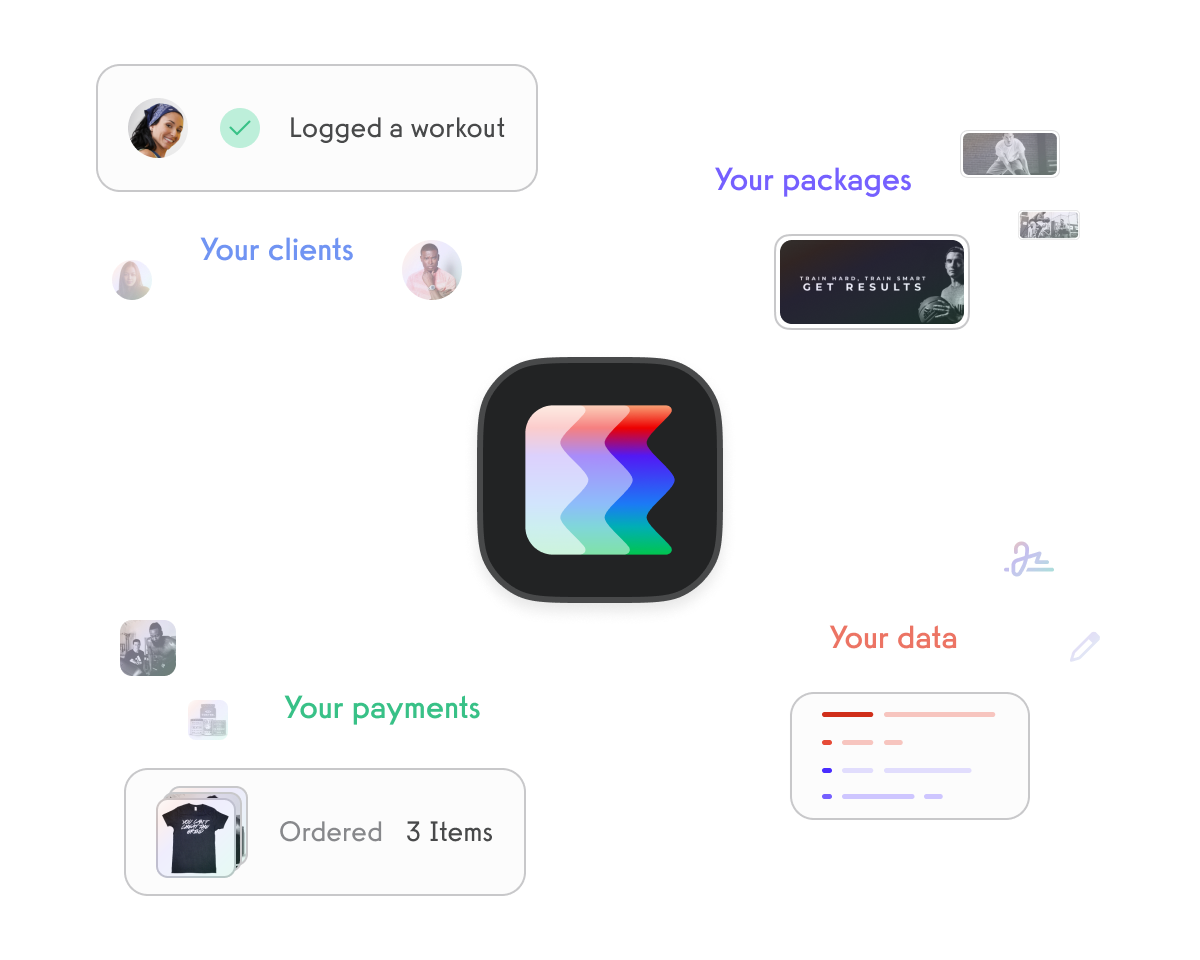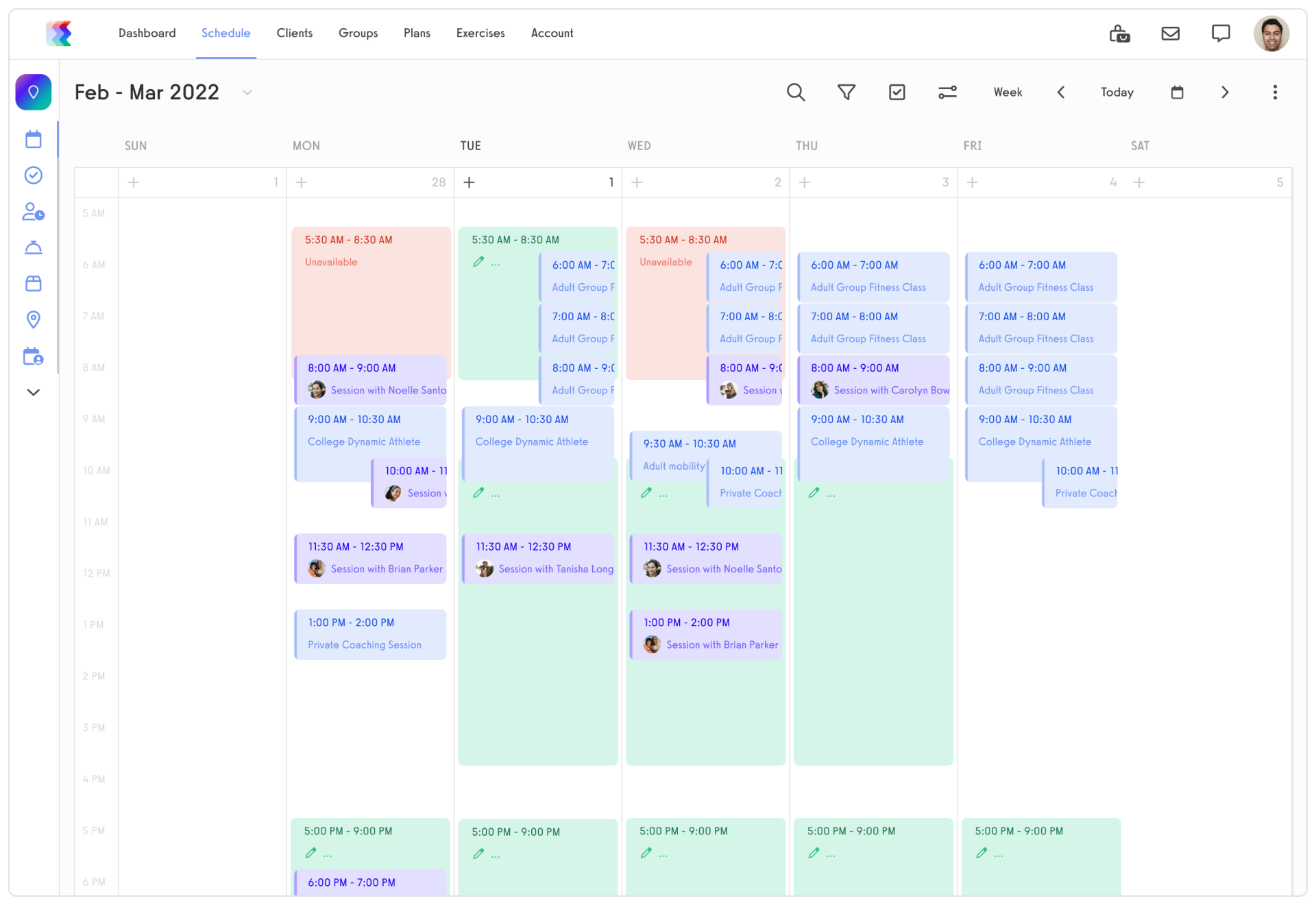Bookee vs GymDay
In the world of fitness and wellness, there are countless tools available to help streamline and automate various processes. Two popular platforms that have gained traction in this market are Bookee and GymDay. If you’re looking to optimize your fitness business or personal fitness journey, it’s worth comparing these two platforms and understanding what sets them apart. In this article, we’ll delve into the features, pricing, user interface, booking and scheduling capabilities, and integration options of Bookee and GymDay.

1. Introduction to Bookee and GymDay

Before we dive into the details, let’s start with a brief overview of what Bookee and GymDay actually are. Bookee is an all-in-one fitness management platform that allows gyms, studios, and personal trainers to handle various aspects of their business, from member registration to class scheduling. On the other hand, GymDay targets individual fitness enthusiasts who want a comprehensive tool to track their workouts, schedule sessions, and monitor progress.
What are Bookee and GymDay?
Bookee is designed to simplify the administrative tasks that come with managing a fitness business. This platform offers key features such as membership management, class booking, client communication, and reporting. It aims to save time and reduce administrative burdens, allowing fitness businesses to focus on what they do best – helping clients achieve their fitness goals.
GymDay, on the other hand, is primarily aimed at fitness enthusiasts who want an all-in-one solution for managing their personal fitness journey. With GymDay, users can track their workouts, create and schedule training plans, and monitor their progress over time. This platform offers a range of features designed to enhance the user’s fitness experience and provide valuable insights into performance.
Overview of their features and functionalities
Bookee provides fitness businesses with an array of management tools. These include membership management, class scheduling and booking, automated notifications, and reporting. The platform also offers a client portal, through which members can access their class schedules, make bookings, and interact with trainers or staff.
GymDay, on the other hand, focuses more on personal fitness tracking and planning. It offers features such as workout tracking, exercise libraries, workout plan creation, progress monitoring, and performance analytics. GymDay also boasts a social aspect, allowing users to connect with friends, trainers, or fitness communities for added motivation and support.
Membership management is a crucial aspect of Bookee’s offerings. With this feature, fitness businesses can easily manage their members’ information, including personal details, membership types, and payment history. This enables businesses to keep track of their clientele and ensure a smooth membership experience.
Class scheduling and booking is another key feature of Bookee. Fitness businesses can create and manage their class schedules, allowing members to easily book their preferred sessions. This feature streamlines the booking process, ensuring that members can secure their spots in classes conveniently.
To further enhance member experience, Bookee offers automated notifications. These notifications can be set up to remind members of upcoming classes, changes in schedules, or other important updates. By automating these notifications, fitness businesses can save time and improve communication with their members.
Reporting is an essential tool for fitness businesses to assess their performance and make informed decisions. Bookee provides reporting features that allow businesses to generate various reports, such as attendance reports, revenue reports, and membership growth reports. These reports provide valuable insights into the business’s performance and help identify areas for improvement.
On the other hand, GymDay focuses on empowering individual fitness enthusiasts in their personal fitness journeys. The workout tracking feature allows users to log their workouts, including exercises performed, sets, reps, and weights used. This feature enables users to keep track of their progress and ensure they are consistently challenging themselves.
GymDay also offers an extensive exercise library, providing users with a wide range of exercises to choose from. Each exercise comes with detailed instructions and demonstration videos, ensuring that users can perform them correctly and safely. This feature helps users diversify their workouts and target specific muscle groups effectively.
With workout plan creation, GymDay users can design personalized training plans tailored to their goals and preferences. Users can select exercises from the exercise library, set the number of sets and reps, and create a structured plan for their workouts. This feature allows users to have a clear roadmap for their fitness journey.
Progress monitoring is a crucial aspect of GymDay’s functionalities. Users can track their performance over time, including metrics such as weight lifted, distance run, or calories burned. This feature provides users with a visual representation of their progress, motivating them to continue pushing their limits.
Performance analytics in GymDay offer valuable insights into users’ fitness journey. The platform analyzes workout data and provides users with detailed statistics and trends. Users can gain insights into their strengths, weaknesses, and areas for improvement, helping them refine their training approach.
Lastly, GymDay incorporates a social aspect into its platform. Users can connect with friends, trainers, or fitness communities, fostering a supportive and motivating environment. This social feature allows users to share their achievements, seek advice, and find inspiration from others on their fitness journey.
Pricing and Plans
When it comes to choosing a fitness management platform, pricing is a crucial factor to consider. Let’s take a look at the pricing models and plans offered by Bookee and GymDay.
Comparison of pricing models
Bookee offers different pricing models tailored to the needs of different-sized businesses. They have tiered plans based on the number of active members and the features required. Pricing ranges from basic plans designed for small studios or personal trainers to enterprise-level plans that cater to larger fitness establishments.
For small studios or personal trainers just getting started, Bookee offers a budget-friendly plan that includes essential features such as membership management and class scheduling. This plan provides the necessary tools to streamline operations and attract new clients without breaking the bank.
As fitness businesses grow and require more advanced features, Bookee offers higher-tier plans that unlock additional functionalities. These plans include marketing tools to help promote the business, custom branding options to maintain a consistent brand identity, and API access for seamless integrations with other software systems. The pricing structure allows fitness businesses to choose a plan that aligns with their specific needs and budget.
On the other hand, GymDay follows a subscription-based model for individuals. Users can choose from monthly or yearly subscriptions, depending on their preferences. The pricing is straightforward and transparent, making it easy for fitness enthusiasts to budget for their personal fitness tracking.
GymDay’s subscription plan includes all the core features of the platform, making it a comprehensive solution for individuals looking to track their workouts and monitor their progress. With GymDay, users can easily create workout programs tailored to their goals, track their exercises, and monitor their progress over time. The subscription model ensures that users have access to all the features without any additional costs, providing a hassle-free experience for fitness enthusiasts.
In addition to its subscription model, GymDay also offers a free trial period. This allows users to explore the platform and get a hands-on experience before committing to a subscription. The free trial period gives users the opportunity to test out the features and functionalities of GymDay, ensuring that it meets their requirements and aligns with their fitness goals.
Breakdown of different plans offered by Bookee and GymDay
Bookee’s plans include essential features, such as membership management and class scheduling, while higher-tier plans unlock additional functionalities like marketing tools, custom branding options, and API access for integrations. Their pricing structure allows fitness businesses to choose a plan that aligns with their specific needs and budget.
For small studios or personal trainers, Bookee’s basic plan is a great starting point. This plan includes the necessary tools to manage memberships and schedule classes, allowing fitness professionals to efficiently run their operations. As the business grows and requires more advanced features, Bookee’s higher-tier plans offer additional functionalities that can help attract more clients and streamline processes.
GymDay, on the other hand, offers a single subscription plan for individuals. This plan includes all the core features of the platform, such as workout tracking, program creation, and progress monitoring. GymDay’s subscription model ensures that users have access to all the features without any limitations, providing a comprehensive solution for personal fitness tracking.
In conclusion, both Bookee and GymDay offer pricing models and plans that cater to the needs of fitness businesses and individuals. Bookee’s tiered plans provide flexibility for businesses of different sizes, while GymDay’s subscription model offers a comprehensive solution for personal fitness tracking. Whether you’re a fitness business owner or an individual looking to track your workouts, there is a pricing plan that suits your needs and budget.
User Interface and User Experience
The user interface (UI) and user experience (UX) of a fitness management platform can greatly impact its usability and efficiency. Let’s assess the design and layout of Bookee and GymDay, as well as their ease of use and navigation.
Design and layout of Bookee
Bookee boasts a clean and intuitive UI, with a design that prioritizes ease of use for both fitness businesses and their clients. The dashboard provides a clear overview of key metrics, such as class attendance and revenue. Navigating through different sections, such as membership management or class scheduling, is straightforward and accessible through a well-organized menu.
The client portal in Bookee also maintains a consistent and user-friendly design. Members can easily view their upcoming class schedules, make bookings, and communicate with trainers or staff through a simple and intuitive interface.
Design and layout of GymDay
GymDay’s UI is sleek and modern, and the platform’s design is focused on providing a visually appealing experience for fitness enthusiasts. The workout tracking section offers a streamlined interface for logging exercises, sets, and reps, while the program creation feature provides a user-friendly interface for creating personalized training plans.
The navigation within GymDay is designed to be intuitive, allowing users to easily access different areas of the platform. With a single tap, users can seamlessly switch between tracking their workouts, scheduling sessions, or analyzing their progress.
Ease of use and navigation comparison
Overall, both Bookee and GymDay prioritize user-friendliness. However, Bookee’s user interface may feel more familiar to fitness businesses due to its focus on streamlining administrative tasks. On the other hand, GymDay’s visually appealing design and intuitive navigation cater to individuals who prefer a visually engaging experience.
Ultimately, choosing between the two platforms boils down to personal preference and the specific needs of the fitness business or individual user.
Booking and Scheduling Features
Efficient booking and scheduling capabilities are crucial for fitness businesses and individuals alike. Let’s explore how Bookee and GymDay address these needs.
Overview of Bookee’s booking and scheduling features
Bookee offers a comprehensive set of tools to simplify the booking and scheduling process. Fitness businesses can create and manage class schedules, set capacity limits for classes, and automate notifications for members. Bookee also enables clients to easily book classes, view their upcoming schedules, and receive reminders, enhancing the overall user experience.
Overview of GymDay’s booking and scheduling features
GymDay provides users with the ability to schedule sessions and workouts based on their individual training plans. Users can block out specific times for workouts and sessions, ensuring they stay on track with their fitness goals. Additionally, GymDay allows users to share their schedules with friends, trainers, or communities, fostering a sense of accountability and support.
Comparison of key features and capabilities
Bookee’s focus on fitness business management reflects in its comprehensive booking and scheduling features. The platform offers robust tools such as waitlist management, recurring bookings, and customizable booking rules. It also supports different types of classes, workshops, or services, allowing businesses to cater to diverse fitness offerings.
GymDay’s booking and scheduling capabilities are centered around individual fitness tracking and planning. Users can create and customize their workout schedules, set reminders, and track completed sessions. The flexibility of GymDay’s scheduling features enables users to adapt their plans to changing circumstances or preferences.
Integration and Compatibility
Integrations with other software systems can greatly enhance the functionality and versatility of fitness management platforms. Let’s explore the supported integrations and compatibility options of Bookee and GymDay.
Supported integrations and third-party software compatibility of Bookee
Bookee offers a range of integrations with popular software applications, such as payment gateways, email marketing tools, and accounting software. Additionally, Bookee provides an API that allows businesses to build custom integrations and connect their fitness management processes with other systems they may be using.
Supported integrations and third-party software compatibility of GymDay
While GymDay doesn’t have as extensive a list of integrations as Bookee, it does support connectivity with fitness-related apps and devices. For example, users can sync their workouts and fitness data with popular fitness trackers or apps, ensuring seamless data transfer between GymDay and their preferred fitness tools.
Comparison of integration options and compatibility
Bookee’s wide range of integrations provides businesses with flexibility and the ability to streamline their operations by connecting with other software solutions they may already be using. The API access also allows for custom integrations, empowering fitness businesses to tailor their workflows to their specific needs.
GymDay’s emphasis on compatibility with fitness trackers and apps allows individuals to easily import their data and track their progress within the platform. While the integration options may be more narrow in scope compared to Bookee, GymDay’s compatibility with fitness-related tools enhances the overall user experience and supports seamless fitness journey management.
In conclusion, both Bookee and GymDay are powerful platforms that cater to different segments of the fitness industry. Bookee primarily targets fitness businesses, offering comprehensive management features to simplify administrative tasks and improve client experience. On the other hand, GymDay focuses on individuals, providing an all-in-one fitness tracking and planning solution with a visually engaging interface.When making a choice between these platforms, it’s essential to consider factors such as pricing, user interface, booking and scheduling capabilities, and integration options. By understanding the unique strengths and features of Bookee and GymDay, you can make an informed decision that aligns with your specific needs and goals.













